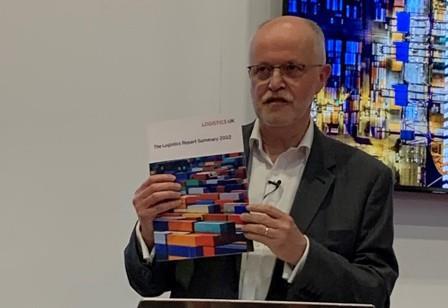
Logistics UK chief executive David Wells has urged the government to cut fuel duty rather than VAT to ease the pressure on hauliers struggling with rising pump prices.
Making the keynote address on the first day of Multimodal 2022 at the NEC Birmingham, Wells said the soaring cost of diesel was the key issue facing the transport and logistics sector and that the government needed to do more to help operators.
He said hauliers had shown “incredible resilience” during the last two years but that the recovery from the pandemic had increased demand for oil-based products, a problem heightened by the war in Ukraine.
“Rising costs are on everyone’s minds as we find ourselves recovering from the pandemic, but we now face a costs crisis,” he said. “Rising fuel prices are the biggest cost for hauliers. And rising inflation, particularly wage inflation, means there is an incredible pressure on logistics businesses when they traditionally operate on margins of 1% to 2%. The sector has also seen a jump in wages.”
Logistics UK used Multimodal to launch its 2022 industry report which includes analysis on business costs, sentiment and the challenges facing the sector.
“Our report shows the cost of operating a 44-tonne truck has gone up 12.1% since last year and smaller operators are likely to be disproportionately affected by the increase in driver wages and fuel costs,” Wells continued. “So what are we doing about it?
“Back in 2021, the government was taking 78p a litre in revenue from fuel. The latest figure is 84p a litre. The chancellor is making 32p a litre in VAT so we think there is some scope for a reduction in duty. I don’t want a reduction in VAT, just a reduction in duty. We’re going to be testing this with our members in the coming months.”
Wells went on to identify the five biggest issues currently facing the sector, all of which he said required “urgent policy action” from government.
“Freezing fuel duty is top of the list,” he said. “But we also want the government to provide incentives for alternative fuels and carbon reduction; improve driver roadside facilities; promote a positive image of logistics and provide flexible funding for skills and vocational training.”
Wells also renewed his attack on the Transport Select Committee’s recent report which recommends a levy on operators unless they resolve the issues facing the sector within two years.
“It has all the hallmarks of Barnoess Vere and is a jaundiced report which is confused and misleading,” he said.
He also reminded delegates that the industry had now paid £700m into the Apprenticeship Levy and drawn out just £150m.
“But in conclusion, there are signs of recovery in the industry,” he added. “There’s much work to be done, and the ongoing economic pressures could easily stall things and hinder any significant growth forecast. However, having seen how far we’ve come in just two years, and how we’ve adapted, I’m confident that we can forge ahead in the months to come.”













